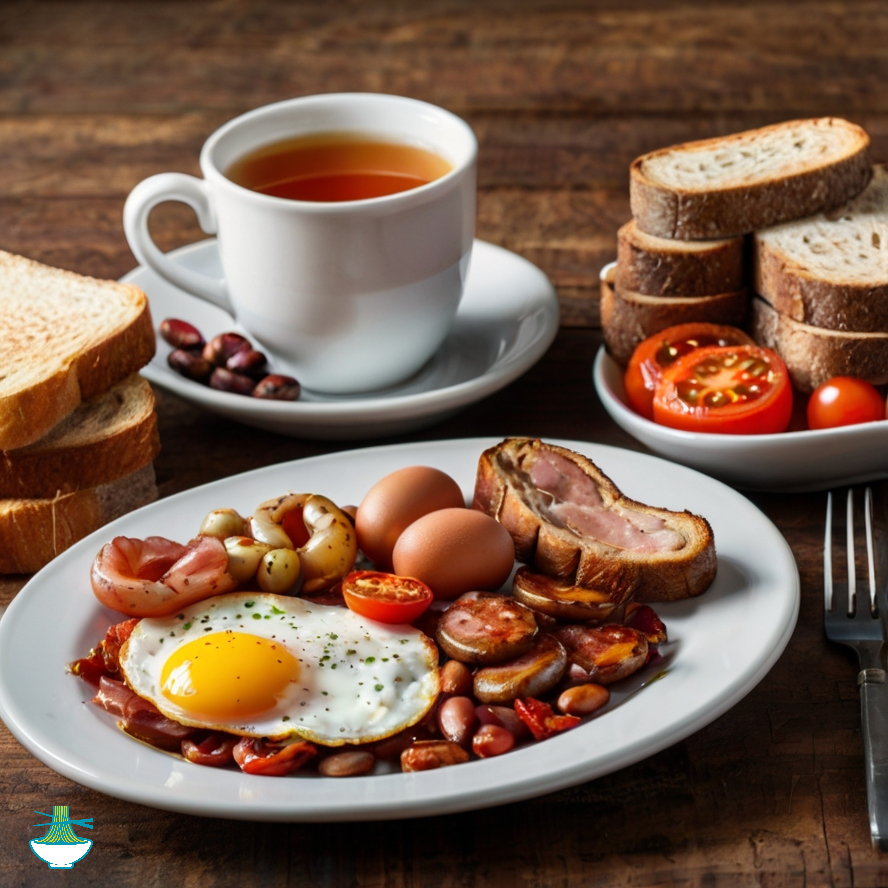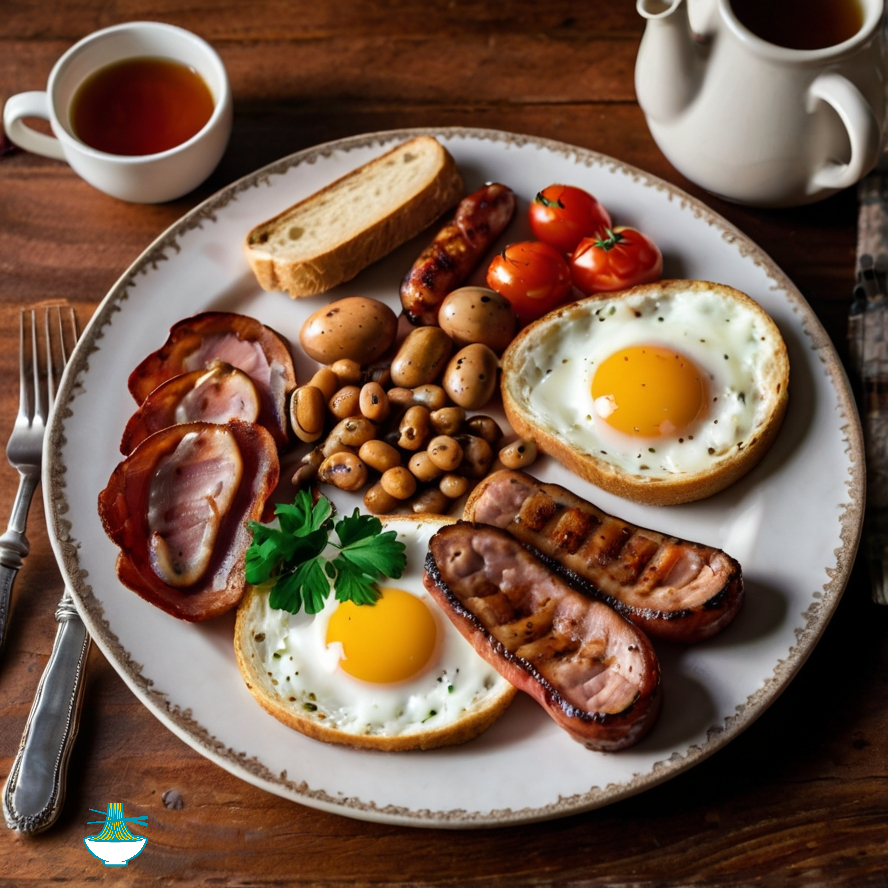The Full Traditional English Breakfast,a staple of British cuisine, is a hearty morning meal featuring bacon,eggs, sausages,beans, tomatoes,mushrooms,and toast.
Its origins trace back to the 19th century, evolving from the hearty meals consumed by rural workers. Over time, it became synonymous with a satisfying start to the day, enjoyed by both locals and visitors alike. The combination of savory flavors and various ingredients makes it a beloved tradition across the UK and beyond.
Ingredients :
- Bacon
- Eggs
- Sausages
- Baked beans
- Tomatoes
- Mushrooms
- Bread for toasting
- Butter or oil for cooking
- Salt and pepper for seasoning

Method of preparation:
1. Heat a frying pan over medium heat and cook the bacon until crispy. Remove and set aside.
2. In the same pan, cook the sausages until browned and cooked through. Remove and set aside.
3. Crack the eggs into the pan and fry until the whites are set but the yolks are still runny. Season with salt and pepper.
4. In a separate pan, heat the baked beans until warmed through.
5. Halve the tomatoes and cook them in the same pan until softened.
6. Cook the mushrooms in the same pan until golden brown.
7. Toast the bread slices until golden brown.
8. Serve all the cooked ingredients together on a plate, with the toast on the side. Optionally, you can add a knob of butter to the toast before serving.
This straightforward method should help you create a delicious Full English Breakfast with ease!
Nutrition Value:
1. Bacon:
- Calories: Approximately 42 calories per slice (varies based on thickness and type).
- Protein: About 3 grams per slice.
- Fat: Approximately 3 grams per slice, including saturated fats.
- Sodium: Varies, but typically high due to curing and seasoning.
- Cholesterol: Around 10-15 milligrams per slice.
- Nutritional Benefits: Provides protein and fat. However, bacon is high in saturated fats and sodium, so it should be consumed in moderation.
2. Eggs:
- Calories: About 70-80 calories per large egg.
- Protein: Approximately 6 grams per egg.
- Fat: Around 5 grams per egg, with a mix of saturated and unsaturated fats.
- Sodium: Low, less than 100 milligrams per egg.
- Cholesterol: Approximately 185 milligrams per egg.
- Nutritional Benefits: Eggs are rich in protein, vitamins (especially B12 and riboflavin), and minerals (such as selenium and choline). They provide essential amino acids needed for muscle repair and growth.
3. Sausages:
- Calories: Varies depending on type and size, approximately 150-250 calories per sausage.
- Protein: Around 10-15 grams per sausage.
- Fat: Can be high, with approximately 10-20 grams of fat per sausage, including saturated fats.
- Sodium: Varies, but often high due to seasoning.
- Cholesterol: Varies based on ingredients and preparation.
- Nutritional Benefits: Sausages provide protein and fat, but they can also contain additives and preservatives. Opt for leaner varieties or those with less sodium for a healthier option.
4. Baked Beans:
- Calories: Approximately 100-150 calories per half-cup serving.
- Carbohydrates: Around 20-30 grams per serving, with a significant portion coming from fiber.
- Protein: About 5-8 grams per serving.
- Fat: Minimal, typically less than 1 gram per serving.
- Sodium: Can be high, depending on the brand and preparation.
- Cholesterol: Usually negligible.
- Nutritional Benefits: Baked beans are a good source of plant-based protein and fiber. They also contain vitamins and minerals such as iron, potassium, and folate.
5. Tomatoes:
- Calories: Approximately 15-20 calories per medium tomato.
- Carbohydrates: Around 3-4 grams per tomato.
- Protein: Minimal, less than 1 gram per tomato.
- Fat: Negligible.
- Sodium: Low, less than 5 milligrams per tomato.
- Cholesterol: None.
- Nutritional Benefits: Tomatoes are rich in vitamins C and K, as well as potassium and antioxidants like lycopene. They promote heart health and may reduce the risk of certain cancers.
6. Mushrooms:
- Calories: About 15-20 calories per cup (sliced).
- Carbohydrates: Approximately 2-3 grams per cup.
- Protein: Around 1-2 grams per cup.
- Fat: Negligible.
- Sodium: Low, less than 5 milligrams per cup.
- Cholesterol: None.
- Nutritional Benefits: Mushrooms are low in calories and fat but high in vitamins (especially B vitamins like riboflavin and niacin), minerals (such as selenium and copper), and antioxidants. They support immune function and may have anti-inflammatory properties.
7. Bread for Toasting:
- Calories: Varies depending on type and serving size, approximately 70-100 calories per slice.
- Carbohydrates: Around 10-15 grams per slice.
- Protein: Approximately 2-4 grams per slice.
- Fat: Minimal, usually less than 1 gram per slice.
- Sodium: Varies, but typically low to moderate.
- Cholesterol: None.
- Nutritional Benefits: Bread provides carbohydrates for energy and fiber for digestion. Opt for whole grain or whole wheat bread for added nutrients and fiber.
8. Butter or Oil for Cooking:
- Calories: Around 100-120 calories per tablespoon of butter, or about 120 calories per tablespoon of oil.
- Fat: Mostly saturated fats in butter, while oils contain a mix of saturated and unsaturated fats.
- Sodium: Minimal, unless salted butter is used.
- Cholesterol: Butter contains cholesterol, while most oils do not.
- Nutritional Benefits: Butter and oils provide fats for cooking and flavor. While they add richness to dishes, it's important to use them in moderation to avoid excess calories and saturated fats.
9. Salt and Pepper for Seasoning:
- Calories: Negligible.
- Sodium: Salt adds sodium to dishes, so use sparingly to control intake.
- Other Nutritional Benefits: Pepper adds flavor without calories or sodium, and both salt and pepper can enhance the taste of foods when used in moderation.


Comments